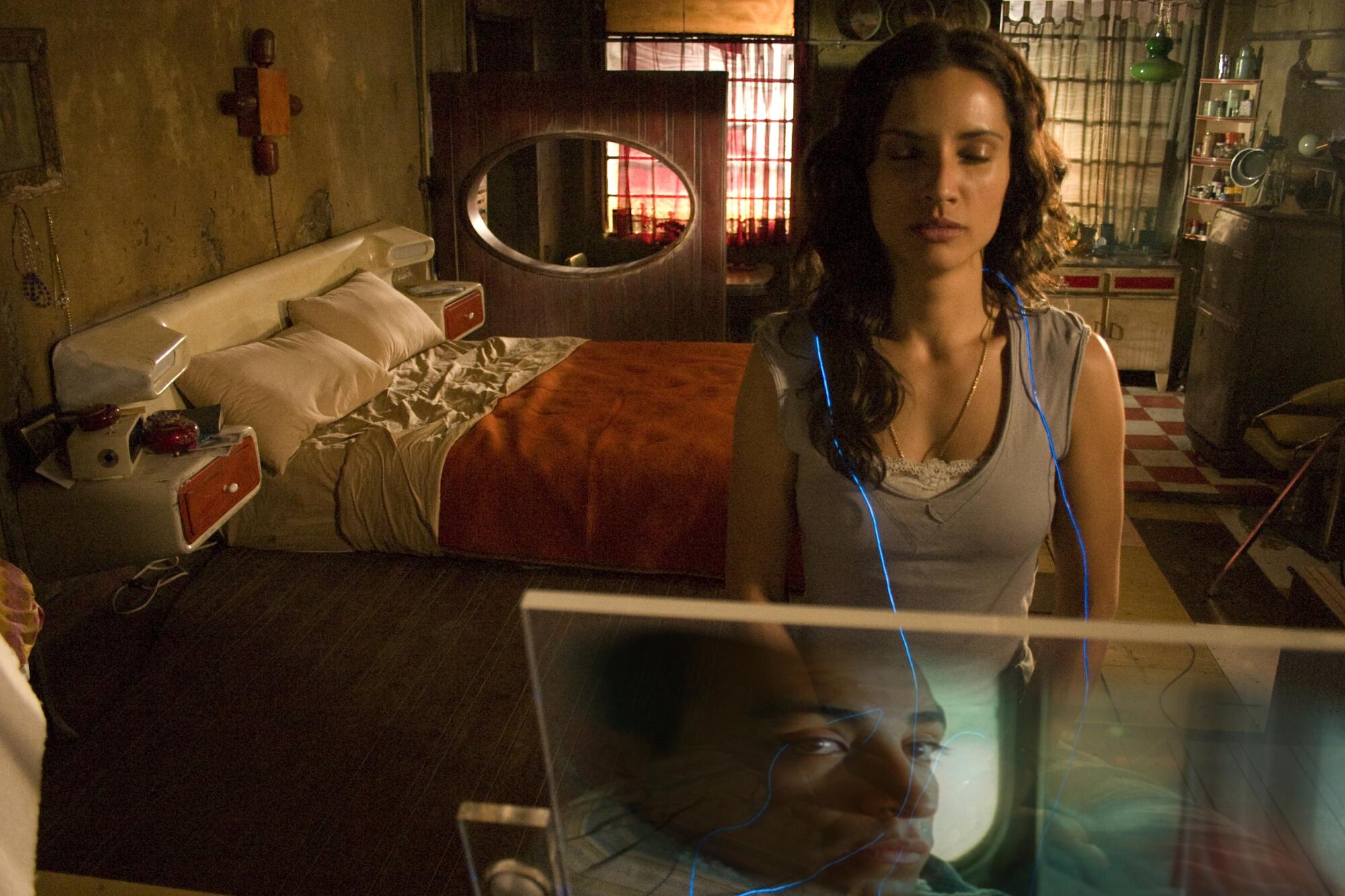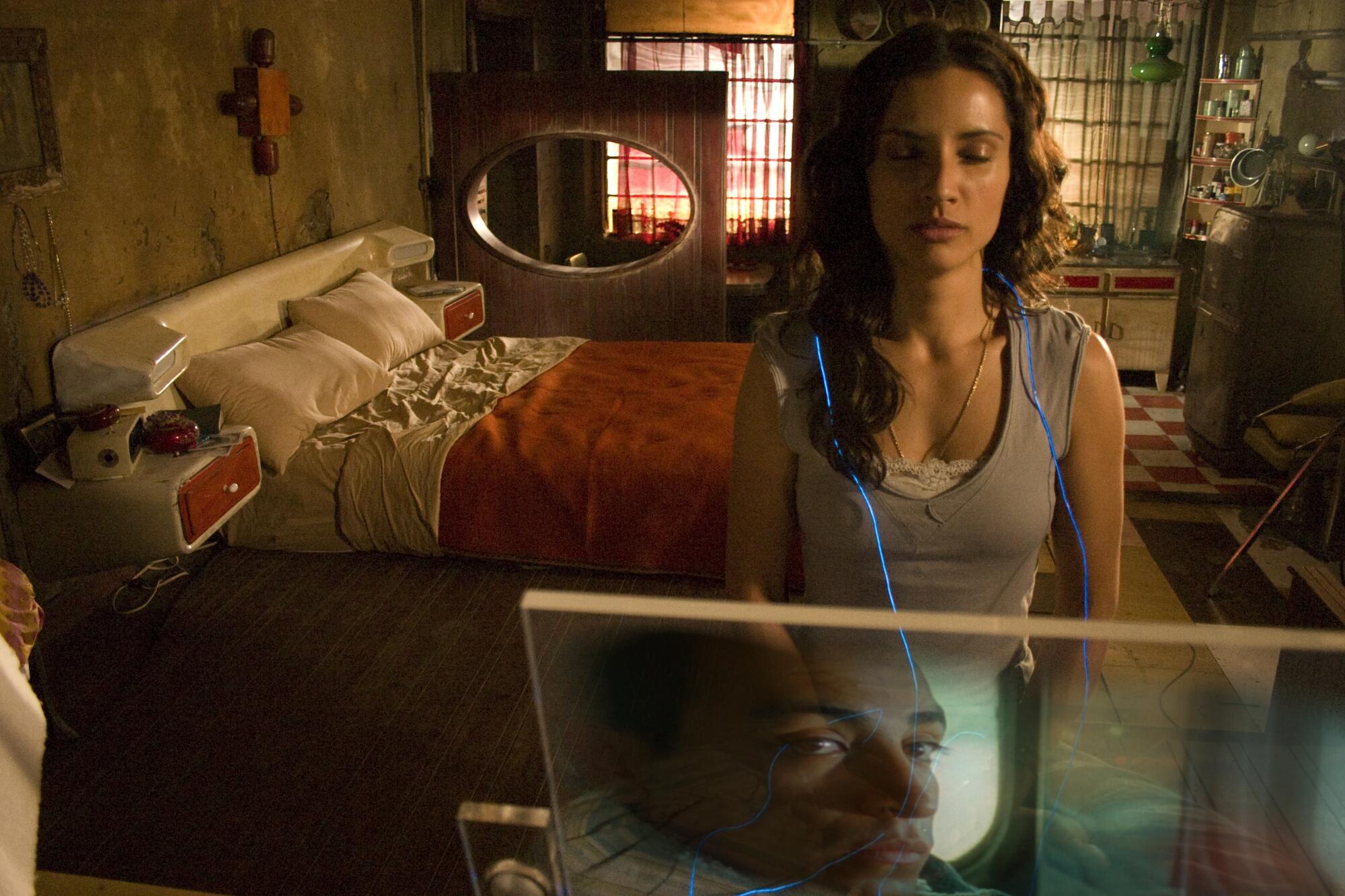Filmmaker Alex Rivera’s award-winning sci-fi film touches on current debates surrounding immigration, climate change and technology.
Militarized water sources. Robot farmworkers. Commercialized memories. Everything is for sale in Alex Rivera’s 2008 sci-fi feature “Sleep Dealer,” in which young, expendable workers from the Global South plug into machines that power the international economy.
Although 17 years have passed since the Latin American cyberpunk film debuted at Sundance — where it won the Waldo Salt Screenwriting Award and the Alfred P. Sloan Prize — its political relevance has not waned. In “Sleep Dealer,” the international borders are closed, but U.S. corporations continue to privatize natural resources and exploit workers in Mexico, where we find our protagonist, a Tijuana robot operator named Memo Cruz. In an America where immigrants are heavily relied upon for labor, yet increasingly surveilled, targeted and deported expeditiously without due process, the dystopian realm of “Sleep Dealer” feels closer to our current reality than ever before.
“There’s a sadness in the reason the film is surviving, because its warnings and its insights about the strangeness of techno-capitalism are becoming more relevant over time,” says Rivera. “But I’m also happy that the film is standing the test of time and being used and spoken about.”
As a Peruvian American filmmaker born in New York City, Rivera derived his fictional world-building from his real-life experience documenting the harrowing stories of migrants in the United States. Since the 2008 release of his feature film, Rivera has stayed busy: winning a MacArthur Genius Grant and cultivating the next generation of Latino filmmakers by launching Borderland Studios at the Sidney Poitier New American Film School. And all the while, Rivera said, the audience for “Sleep Dealer” has continued to grow year after year. The movie recently screened in 35mm to a packed house at the Academy Museum of Motion Pictures in Los Angeles, as part of its “Cyberpunk: Envisioning Possible Futures Through Cinema” series.
When Rivera and I connected via Zoom call, it felt like we were living our own dystopian reality in Los Angeles; I had just finished reporting on the Los Angeles wildfires and Rivera had returned to his home in Pasadena after evacuating from the Eaton fire. In our latest interview, Rivera discusses the lasting relevance of his film and what he hopes to inspire in viewers today.

(Courtesy of Futuro Films)
This conversation has been edited for clarity and length.
I’m not Mexican American, but I was deeply touched as someone who exists as a part of a diaspora. What was your intention behind making this film primarily in Spanish?
At the beginning of this process, there was this aspiration to make something that had this pop culture pulse, but post-colonial politics … A lot of the pleasure and the point of “Sleep Dealer” was to invert preconceptions about the future. And one of those is the idea that the future is English, and that the English-speaking world is where the future is being built and written. That is not true. We see it more every year now … the future is going to be multi-lingual. And so the idea of doing science fiction in Spanish was very exciting, to say that this language is not something of the past, but it’s a component of the future.

Alex Rivera is a MacArthur Genius Grant recipient examining the future of work and workers.
(Gina Ferazzi / Los Angeles Times)
In your film, people no longer do physical labor, but they mechanically operate a lot of what we see in the world. In “Sleep Dealer,” the main character, Memo Cruz, operates this robot remotely from Tijuana to construct a building in San Diego. How do you think that added layer of technology in “Sleep Dealer” exemplifies the dehumanization of migrant labor in today’s economic workforce? The argument from both liberals and conservatives around immigrant labor is that we should legalize this group of people because they provide labor to our country.
I start with the basic notion of the alienation of labor that surrounds us every day. The labor that goes into producing food that we consume, clothes that we wear and the buildings that we live in — it’s rendered invisible.
The idea of a worker in another region, in another country, remotely controlling a machine that’s acting and doing things here is an exaggeration or a heightening of that basic dynamic that surrounds us. The systems of technology that are now connecting the planet allow for these extraordinarily extreme and heightened forms of transmission and capture. There’s always a ghost in the machine, no matter what a corporation wants to present their product as a transcendental object.
I want to touch on the idea of technology as a form of connection and disconnection. We see Memo trying to get the nodes in his skin so that he can be connected to this global economy. Installing technology under our skin isn’t commonplace (yet), but I see a lot of parallels between how Memo experiences digital apartheid in his world and ours. Just like if you don’t have internet in your town, then you are shut out of this global economy. There are ways that technology can exacerbate existing inequalities.
Memo’s family is from Oaxaca, where a huge corporation has militarized a dam upstream. All of the natural resources are being guarded heavily because of climate-induced scarcity. As you were making this film, how were you thinking about climate change?
Those ideas all came from a simple thesis: that capitalism is amoral and will gobble up anything it’s allowed to gobble up. In this world, capitalism has run wild, captured everything, even the water, and packaged it to sell it back to people from whom it was taken. But then that kind of thinking rolled out and applied to things like our memories. Could our memories be bottled like water and sold? What about our friendships? Our relationships, our time, etc. So this kind of logic of capture, enclosure and commodification is the rationale that binds together all of the world-building of “Sleep Dealer.”
We also see Rudy Ramirez, a fighter drone pilot, rebelling against his directives. He is Mexican American, but he is also an arm of the violence on people who look like him. How do you make sense of that as we consider the limitations of identity politics today?
I find identity politics broadly to be the only way to make sense of American history. You can’t really understand the United States, its past and its present, without looking at the way that race has been structured and formed in this country and deployed to create friction and competition among the working class.
It is true that Black and brown people get swept up in the imperial core and become the enforcers of the regime that perpetuates their exclusion and inequality. Rudy is depicted as an agent of the empire, but there’s a fault line in his being.
We see that in our own families of color, who join the police and the armed forces of color and are often dispatched to lands that have suffered violence. So the Latino family uprooted because of the U.S. and CIA-backed civil war in El Salvador, coming here, giving birth to a son or a daughter, who then joins the armed forces and is dispatched back to the Global South. These kinds of circles, we see them in our families. It’s a reality that’s rich and complicated, because identity is not abstract.
In the movie you have “coyoteks,” a futuristic version of coyotes who smuggle people across the border to become migrant laborers in the U.S. These coyoteks are also facilitating a transfer of labor by illegally implanting these nodes under their skin. Can you talk a little bit more about your inspiration?
[Melvin Kranzberg] once said, “Technology is not good. Technology is not bad. It’s also not neutral.”
Technology is a shape or a form that enables certain things and disables others, and there’s room to navigate, but there are also constraints. That was the philosophy of “Sleep Dealer.” These technologies, when released into capitalism, are immediately deployed to create forms of alienation, extraction and hyper-profit to create conditions in which corporations and capitalists can move with ease and accelerate their work.
But those forces aren’t the only ones that surround these technologies. Other impulses surround them: the impulse to not be alone, to hear a loved one’s voice, to connect with other people who share your identity group and political commonalities.
When I was developing “Sleep Dealer,” I was very aware of how the Pentagon and corporations were using technology … but also how the Zapatistas used it, how the World Social Forum used it and how I was using it every day in my life. So the depiction of technology in the film is meant to be one of technology as a kind of battlefield with a powerful tendency towards alienation and extraction.
But the story is not over. There is space in which to hack, to struggle and to create alternatives and strip these technologies out of the capitalist cradle where they were born, to use them for other things.
